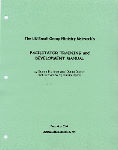When you have a successful small group ministry program, you will know it and feel it. Our job in the church is to nurture and support the program and help other congregations take it to scale. Let's promote the program in our churches. Every chance we get, we should say, "If you're not in a small group, you may be missing out on a key connecting point in our congregation." When something goes awry in some group dynamic, it usually is not too difficult to troubleshoot the problem. What went wrong? What could we have said or done? Have we honored the spirit of our covenant? Certainly, programs require regular and steadfast attention and guidance. For that reason, we hold leader meetings, scheduled about every six weeks, with the minister attending.
One of the pivotal moments in our program occurred when we began to speak of holding symbolically an empty chair for a new member. Later, groups were able to do so concretely, welcoming new members to their groups, and adjusting group dynamics and content appropriately. The act of welcoming a new person shifts the relational dynamics of a group. To the extent we are able to welcome someone new, we learn and get to practice the art of hospitality, one of the key benefits of our small group ministry with beneficial consequences outside the group.
The benefits are twofold: a new person is welcomed and the group gets to practice a spiritual discipline worth cultivating in our lives, in and outside the church. In family life, a grandparent moves in, a child is born, or family members make new friends when they move into a new neighborhood. In congregational life, almost nothing is static: members are joining, moving, dying. Congregations are living, breathing bodies, always in the mode of change. The practice of hospitality genuinely welcomes new persons and their stories, and integrates change.
The presence of small group ministry in a church encourages right relationship and diminishes acting-out behavior in the larger church community because the modeling of right relationship in small groups extends to right relationship in other arenas of our lives as well. In The Company of Strangers, author Parker Palmer describes community as "that place where the person we least want to live with always lives." Want to end a divorce well? Practice right relationship. Want to learn how best to dismiss an employee if you are the one who must do it? Practice right relationship. Want to work through a child, sibling, or parent problem? Practice right relationship. Want to make this a better world? Practice right relationship as part of a simple discipline where ground rules and a covenant are honored. This is not country club membership. Country club membership is about trying to get the club to meet the pleasures of its constituents. Religious community is about taming the ego and sacrificing personal freedoms. In other words, we learn why not saying and doing everything we want to say and do is part of being in loving relationship with one another. Country club membership does not necessarily concern itself with love. We must be concerned with love and right relationship. Being in right relationship is critical in religious community and in small group work. Each time we meet, we hold out to one another mutual respect, hope, and expectation of a better world.
These are what we may call unintended consequences of small group ministry. And there are more. Mutual listening. Good communication. Mutual well-being. Not all of us have had the experience of speaking about our lives in the presence of peers -genuine, intentional listeners. A successful small group sets norms for the conditions of good communication and mutual well-being. Some members call it healing, especially when someone who has not been heard or has been misunderstood in life is heard and understood. Religious community is the place for finding one's voice -the place for healing the soul.
As members find their voices, church leaders emerge. Here in our church we proudly recognize our group leaders' involvement. Once a year, we ask them to stand for a brief recognition in Sunday morning church services. We remind them, "You leaders are hand-picked for your listening and group skills." We are not reluctant to call them leaders. A leader is a guide, a conductor, who exercises authority responsibly. Leaders most definitely set limits, often reminding the group of its covenant. "Leader" is the precise word here. A weaker noun sends a weaker message and might yield a weaker group.
One evening, several years ago at a leaders' meeting, we discussed a listening model we might apply if and when difficult or emotional material is shared during the check-in portion of a small group meeting. What should a leader do? Scuttle the format for the evening? Engage in cross-talk about the content of what was shared? What emerged was a better alternative: The leader asks the group members to be silent for one minute before proceeding with check-in. Allowing the evening to proceed after a minute of silence provides two benefits: we acknowledge that something significant was shared and we acknowledge we are carriers of trust by virtue of our covenant with one another. Something difficult having been shared does not oblige us to comment. Singer/songwriter Billy Joel has advice, fitting for a common situation in small groups: "Leave a tender moment alone." Later, outside of the group, any individual has the option for follow-up -a phone call or a conversation over coffee, for example. Even in a follow-up setting, deep listening are the watchwords. Attempting to fix someone's existential situation is outside the bounds of small group ministry.
I submit the benefits of small group ministry are both personal and societal, affecting the public and political realm of our existence. In meeting one another face-to-face, we are confronting a social reality of our culture and its loneliness. Remember the prediction decades ago that one day we would all be living in a high-tech, low-touch world? We now live in that world.
"Loneliness," says Parker Palmer "is not just a personal problem, it has political causes and consequences. We are lonely because a mass society keeps us from engaging one another on matters of common destiny. And loneliness makes us prey to a thousand varieties of political manipulations." (Parker Palmer, A Place Called Community.)
Under the power of strong consumerist influences, our culture appears to be run by the marketplace. But marketplace values must be held in check. The marketplace does not trump spiritual values. Desire fulfillment does not equate with a meaningful life. It is said that our culture is coarsening and we are all suffering from its incivility. Electronic communication has gone viral -insulting at times, promoting pseudo human connection all of the time. And in our era, except for those who serve in the military, American citizens are rarely asked to sacrifice freedoms for the sake of others. Consumerism, incivility, and virtual connection are features abundant in our culture, while meaning goes begging in the streets.
Welcome to the church and its small group ministry where, without a doubt, good leaders set norms. They gently, sometimes assertively, reset a conversation and get people back on track with the ground rules, the covenant. I know of leaders who courageously (after an evening session) spoke to an offending group member's comment about another person -all in a spirit of restoring a sense of the beloved community. Learning to live in right relationship is a spiritual disciple.
We are told Isaiah predicted, and Jesus reiterated, "... the rough ways shall be made smooth." How many rough edged people have we known who were transformed into more comfortable people to be around? Have they not also become more comfortable in their own skins because they have, in fact, changed? From the beginning, to change might have been their unintended consequence!
Adults, to be sure, look to us in a time of trouble. Those who lead successful programs believe adults are looking for maturational and spiritual growth though such needs may not be explicitly stated. We speak of the intimacy involved in meeting face-to-face; listening heart-to-heart. We speak of ultimacy and depth. Leaders, as your group members become more comfortable and trusting of one another, do not be afraid on some evening to say, "I hope we can plumb our souls a bit tonight. Let us risk together the seriousness of the material at hand." Ultimacy and depth suggest spiritual content. Spirituality suggests breath, holiness, ruach, even the breath of God.
Actively engaged, deep listening and sharing are attributes for a community of care. Often in small groups we are counter-poised to mass culture. We speak and listen to the countervailing small voices inside one another. By extension, our practice of right relationship cares for the body politic. The larger world is thus meaningfully touched, moved, and transformed by our work. How could it not be so?
~ ~ ~








